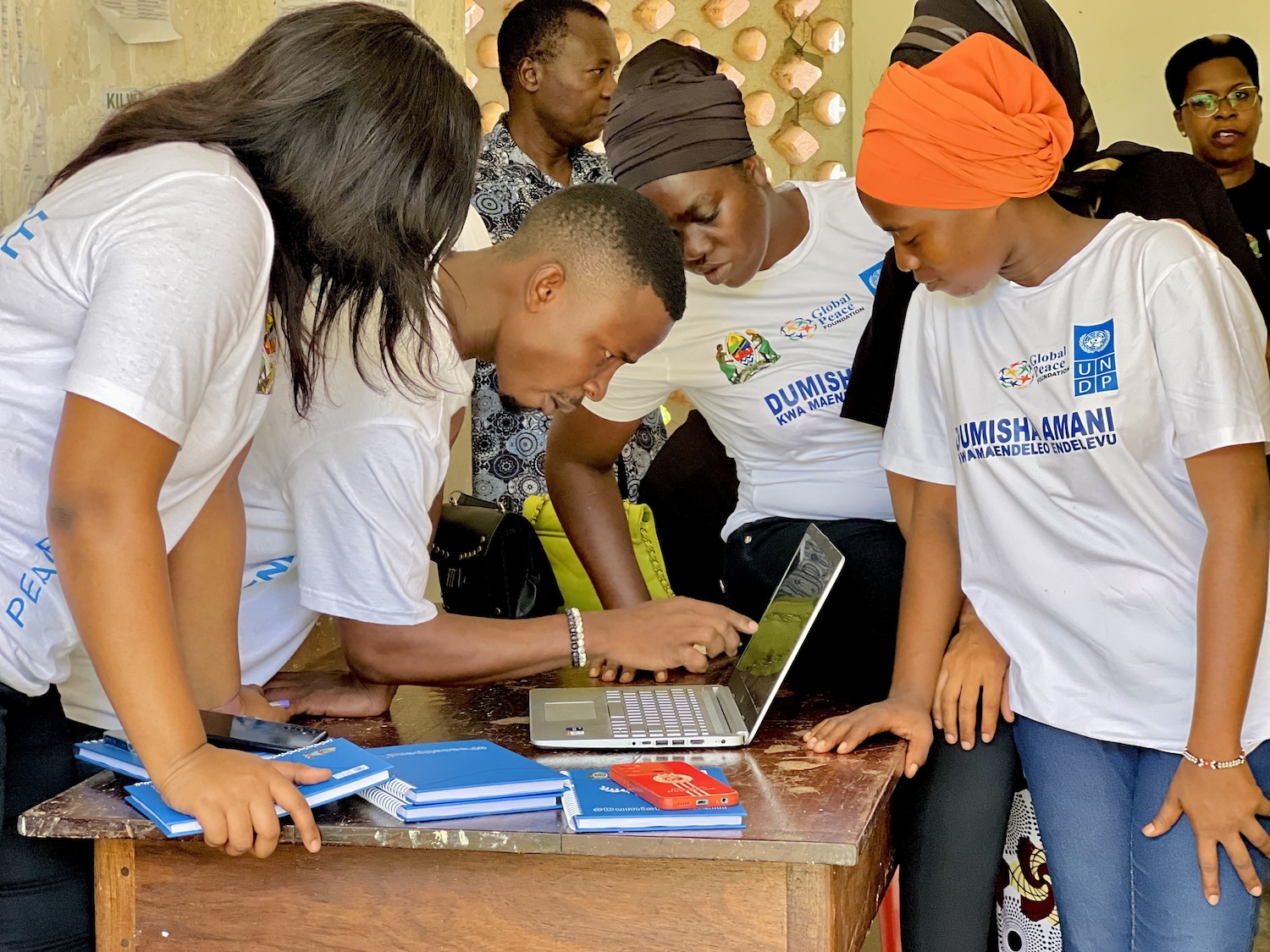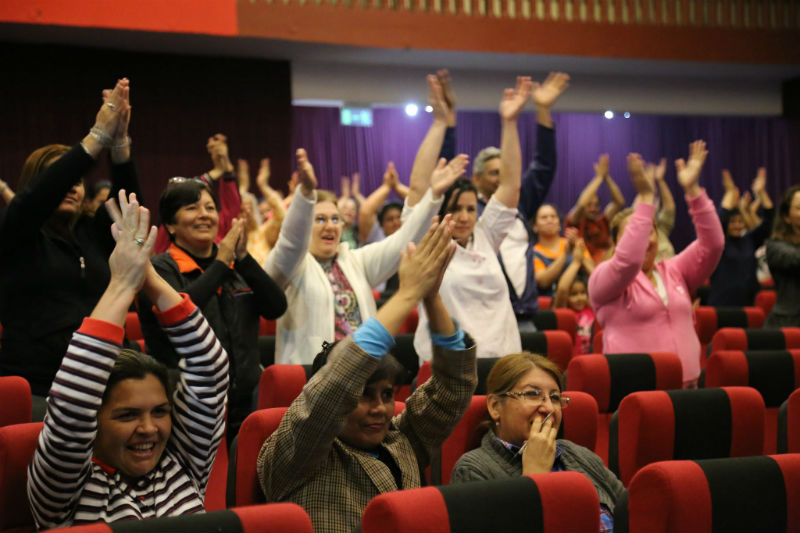
“Right now, in the hotels across this city, there are juveniles and adult women being forced into prostitution. This is not something happening somewhere else, this is something happening to our children,” said Michelle Morgan, Assistant United States Attorney, at a recent sex trafficking forum in Philadelphia.
Law enforcers, social workers, nonprofit staff and faith leaders gathered at the Salvation Army on October 15, 2015 to discuss the ongoing challenges and strategies to tackle human trafficking in Pennsylvania and the United States.
The one-day forum, “Engaging Faith Communities: Ending Human Trafficking,” focused on how communities can become powerful agents in tackling the issue through spreading awareness and disseminating and calling the national hotline number, 1-888-373-7888, if human-trafficking is suspected.
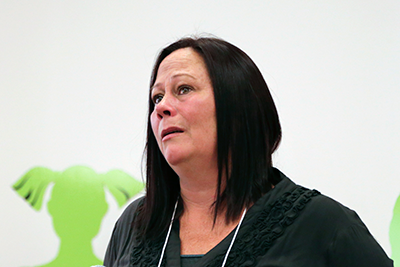
Anne Marie, a survivor of sex trafficking, shares her painful story.
Speaker Anne Marie Jones, a sex trafficking survivor, explained that although she was older, she easily was conned into sex trafficking through her vulnerability from having had a very troubled family background. Once trafficked, her pimp used severe emotional and physical abuse to keep her from leaving. Finally breaking free in 2012, she is now a mentor at the same facility where she was rehabilitated, Dawn’s Place, and recalls, “I was 44 years old but I only had a third grade level education . . . then they got me a teacher and a tutor. Dawn’s Place is a special place and will always be my home.”
The forum was organized by the Administration for Children and Families (ACF) and Global Peace Foundation USA. The Salvation Army graciously hosted the event at their Philadelphia Center.
The many challenges and solutions were outlined in three sub-forums that gave perspectives from the law, faith and social service sectors.
Law Enforcement
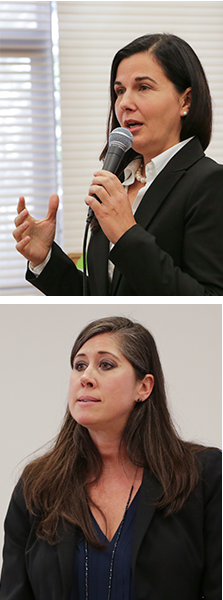
Michelle Morgan, Assistant U.S. Attorney, and Shea Rhodes, Esq., Vilanaova Law Institute to Address Commerical Sexual Exploitation speak on human trafficking from a law perspective.
Michelle Morgan, Assistant United States Attorney, explained that the majority of her cases are girls and women who grew up around Philadelphia and met a guy that said he wanted to be their boyfriend who “literally within days turned them into a prostitute.” She said she sees victims from all walks of life—from the foster care system to the incredibly wealthy living with their family, and from all ethnicities.
She explained that sex-trafficking is one of the fastest growing crimes as it is extremely easy and lucrative, where recruitment can occur online with less than $100 spent—for advertising, a phone and a motel—with a pimp’s average earning of $4,000 to $6,000 a day through their 4-6 girls. “The average girl engages in 10 acts of rape per day with strangers. . . . a 14-year-old . . . on her back 10 times a day with strangers in a hotel room,” Morgan said. In 100 percent of her cases, the victims are getting zero dollars. And yet the common notion of prostitution still remains: “well, they choose to prostitute themselves so they can make money.”
The fact is that these women are beaten and raped by their pimp and left with no money, no place to go and no hope, Morgan said. In many cases, when the victims want to escape, pimps force them on drugs so that they will continually need to prostitute to feed their addiction, “a very, very effective trap,” she continued. She lamented that unfortunately prosecuting the perpetrators is challenging as the cases rely heavily on a victim who is many times homeless, threatened and emotionally and psychologically traumatized.
Speaker Shea Rhodes, Director of the Vilanova Law Institute to Address Commercial Sexual Exploitation, explained what loopholes are currently allowing pimps to walk free and urged the audience to call their constituents to secure critical litigation that her organization is advocating for.
Faith Community
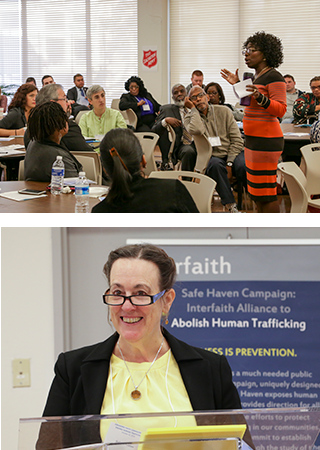
Ellyn Jo Waller, Ed.D., Anti-trafficking Advocate, Enon Tabernacle Baptist Church and Gail Hambleton, Vice President of Global Peace Foundation-USA share how the faith community can become a powerful tool against trafficking.
“If you imagine she is your sister, how quickly would you turn the other way and walk away? How quickly would you pretend you didn’t see somebody? She is somebody’s daughter,” said Ellyn Jo Waller, Ed.D., Anti-trafficking Advocate of the Enon Tabernacle Baptist Church. Walking around the room she passionately expressed that it is the faith communities’ duty to work on the issue.
Gail Hambleton, Vice President of Global Peace Foundation-USA, shared how the “Safe Haven Campaign” works in 10 states promoting public awareness to prevent human trafficking through training faith communities in knowing how to look for victims and report them, and get involved in anti-human trafficking organizations. “In one state, the Assistant U.S. Attorney General sent us to specific faith communities in neighborhoods where trafficking was increasing to engage them. We saw more tips being reported. In one year, 141 leads were received from the community; you could really see the correlation.
“When you think about the natural network that we have as faith communities and then if we are really able to work together, we can make an enormous difference,” Hambleton said.
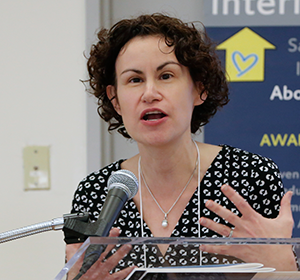
Rabbi Rachel Kobrin of the Congregation Adath Jeshurun, says we must not sit around idly but stand up and free these slaves.
Rabbi Rachel Kobrin of the Congregation Adath Jeshurum expressed the significance of hearing stories in the Jewish tradition. She related how stories, like the one of survivor Anne Marie, move people to the point of taking action.
“I believe that we say those stories and prayers because we remind ourselves that we have the capacity to be a partner with God,” said Rabbi Kobrin. “And each and every day we walk the streets, we have the capacity to help free slaves. Because if we are not doing that, nobody else is going to do that . . . Everything we heard about today should not be happening in modern-day America!” She then urged the audience to remember the story and commit to doing one act to help the cause.
Social Service Sector
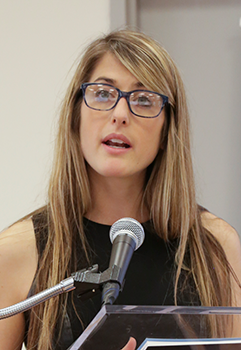
Jamie Manirakiza, Director of Anti-Trafficking and Social Services of the Salvation Army, talks about how her team’s unique approach keeps victims from returning to the streets.
Jamie Manirakiza, Director of Anti-Trafficking and Social Services of the Salvation Army shared that recidivism of survivors going back into prostitution is common. She focused her talk on how we can successfully help them to stay out. “Change happens through self-actualization. Change is a process and recovery is a process. If you take something away, you have to replace it with something,” Jamie said. “They’ve experienced significant trauma . . . we can’t just expect them to stay there and to understand how to function in this whole new world.”
Jamie’s job is to work with clients to see what is missing in their lives and what is going to work for them on the journey of aftercare service. She said that everyday their case workers go on foot with survivors to wherever they need to go, to get an ID for example, because it makes them feel valued. She shared that they tell her, “for the first time in my life I feel like someone cares about me.” This client-driven model is unique and a caseworker will work with a survivor for an average of three months to two years but there is no cap.
“Trafficking is multiple perpetrators, multiple times, over a prolonged period of time, resulting in complex trauma which is going to take a very long time to unwire and to undo,” Jamie went on to say, adding that a multi-disciplinary task force is needed to tackle the issue. She stated that this is becoming a trend across the nation.
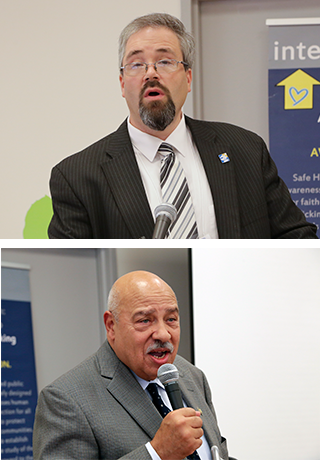
Hugh Organ, Associate Director of Covenant House-Philadelphia speaks on the importance of empowering victimized children and Alan Inman, President of Global Peace Foundation-USA, urges men to step up and get involved in the issue.
The Associate Director of Covenant House Philadelphia, Hugh Organ, shared how children can be helped through love, respect and empowerment. The Covenant House is the largest non-profit shelter for runaway, homeless and trafficking victims under the age of 21 that choose to be there, “which is half the battle,” Organ said. They make sure youths’ basic needs are met and then empower them to create change in their own lives with job support and transitional housing through the Right of Passage Program. Organ asked strongly, “Where is the rage?” and urged the audience to get involved with a coalition.
In closing remarks, Alan Inman, President of the Global Peace Foundation USA, called on men to step up to the plate, saying they are largely missing from the anti-trafficking movement, yet are largely the cause of it, as purchasers. “Men need to get truly involved in this issue, and who knows, through their association with other men that might be involved, even as purchasers, maybe that will begin to have some impact as they’re saying, ‘What are you doing about it?’”

Audience members commit to pioneering anti-human trafficking efforts
Darlene Tart, Special Initiatives Coordinator, HHS, Administration for Children, skillfully moderated the program, ending with a robust action-planning session. Participants expressed their commitment to creating measurable outcomes through spreading awareness campaigns on social media, donating clothes and toiletries, writing grants, offering awareness training, preaching anti-trafficking-centered sermons, and finding a larger venue to gather for future programs.
To get involved contact Gail Hambleton at [email protected] and join the Safe Haven Campaign. Also follow us on Facebook.
Co-authored by Zhuozhuo Liu


